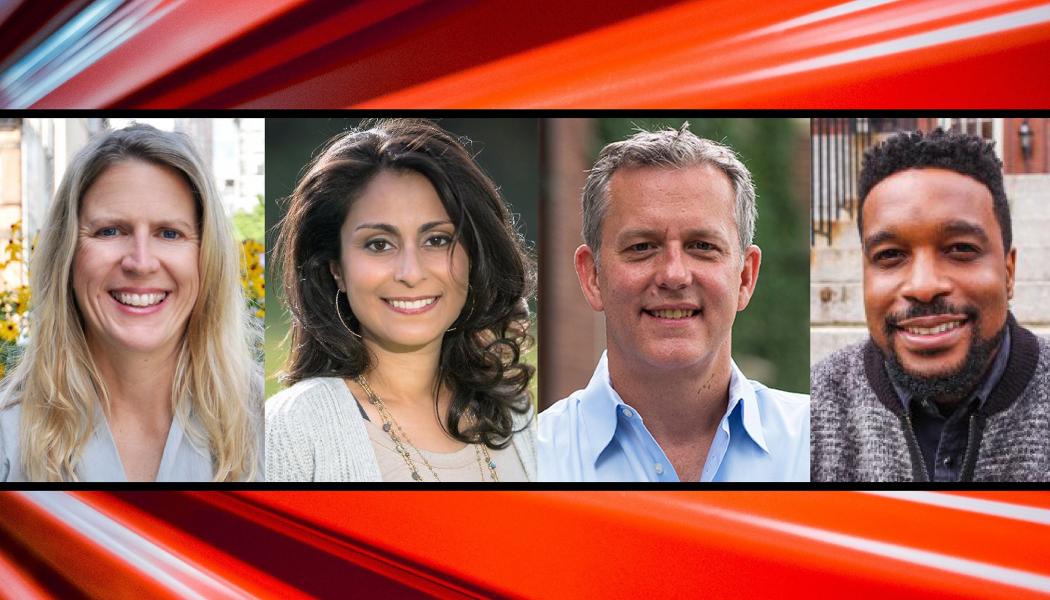
Moderated by Princeton’s newest Young Alumni Trustee Morgan Smith ’21, June’s Forward Fest — the final installment in this year’s online series that spanned A Year of Forward Thinking — revisited key topics in light of the rapidly changing global landscape and in concert with other themes. Held June 16, the online event “Thinking Forward: Bringing Themes Together” featured conversations with infectious disease expert Celine Gounder ’97 and professors Allison Carruth, Eric Gregory and Laurence Ralph.
Gounder, who previously moderated the October 2020 Forward Fest session on public health, returned to discuss the nation’s response to the COVID-19 pandemic and what she sees as the next steps to ensure that we learn from the experience. An internist, infectious disease specialist and media journalist, she served as a medical adviser to the Biden-Harris administration. In this session, she outlined a major lesson from the past year: the importance of not politicizing a public health emergency and letting it exacerbate ideological divisions.
“I think it's really important to focus on the science, lead by the science, but at the same time to recognize that there are economic and political consequences to something like this,” Gounder said. “I think, unfortunately, this was very much turned into public health and science versus the economy.”
She acknowledged how the marriage of her broad-based liberal arts background from Princeton and her subsequent media training has helped her navigate the complexities of the pandemic as an adviser to the current administration.
Throughout her years as an adviser and now medical journalist, she has seen public health crises around the world garner short-term attention but little done in the way of long-term support of infrastructure to prevent future incidents. When asked what keeps her up at night, she answered frankly, “I'm afraid we're going to forget. I’m afraid we’re going to put this behind us and not do the work we need to be doing to get everyone around the world vaccinated.”
That theme of forgetting was echoed by Laurence Ralph, professor of anthropology. In the October 2020 Forward Fest session on justice, Ralph spoke about how our societal willingness to talk about police violence was a direct result of our society’s “shared sense of endangerment” during the pandemic. Now that we are seeing a shift to reopening society and moving out of some pandemic restrictions, he said he worries that there is a danger of forgetting. “I think part of the normal that existed before the pandemic was the ability to be distracted and the ability to not have to consider certain things because that’s not a part of your everyday reality,” he said, “and I think there is a danger of going back to that.”
During the pandemic, when Ralph could not easily do field work, he reimagined ways to communicate his research on urban violence and police violence, including creating an animated film and forthcoming graphic novel. He said that this reconceiving should also extend broader approaches to society’s challenges. “I think oftentimes we get complacent and blocked and our political discourse is about just the pragmatics of what we think can actually happen, rather than taking bold steps to create the world we want,” he said. “We don’t want to wait until we’re faced with the crisis to do that reimagining.”
Continuing the theme of shared responsibility for society, Eric Gregory, professor of religion and chair of the Humanities Council, spoke on his latest research on historical and contemporary ideas of what we owe one another. As an ethicist approaching topics of moral philosophy and religious thought, he has embarked on a project surrounding the parable of the good Samaritan. “It has become a very attractive parable for today, particularly for encouraging us to care for people who are not like us and to transcend boundaries, whether those are of race or religion or geography.”
Gregory said in today’s landscape when the local and global are sometime intertwined, the idea of the good Samaritan questions what role national identity should have “in the way we think about our moral life and the bonds of citizenship that we have and does that mean we owe more to fellow Americans than we might to distant strangers?”
In looking at this story, Gregory discussed how he has worked with scholars in a variety of disciplines, including development economics, anthropology and history, and how the humanistic lens brings a multitude of viewpoints to bear on issues central to what it means to be human. “Many people say that we need the humanities, now more than ever, as we’ve thought about in this year of kind of alienation and often loneliness as well as a desire for connection to the world,” he said. “We've seen in the debates we are having both in the United States and around the world that humanists have much to contribute, not just to apply the humanities, but that the questions that face us are very much humanistic ones.”
The final segment of the program exemplified the importance of humanism. Allison Carruth, professor of American studies and the High Meadows Environmental Institute, discussed how storytelling is vital to connecting society with global environmental issues and an orientation of action. Interested in environmental narrative and the evolving relationships between technology, ecology and environmentalism in American culture, Carruth discussed how her work necessitates interdisciplinary bridges across the humanities, the arts and sciences. “The problems that we’re tackling are so very complex in the 21st century that to approach them through a strictly technical or data driven or legal lens is insufficient,” she said. “Those are absolutely crucial, but insufficient.”
Following the interview portion of the program, registered attendees joined Morgan Smith and professors Carruth and Gregory in a private Zoom conversation. The break-out group discussed a wide range of forward-thinking ideas, concentrating on new approaches to the arts, technological innovation and bridging political divides.
An eighth downloadable resource guide was added to the online library of guides that have accompanied each Forward Fest installment. They include suggested books, articles, videos and podcasts for further exploration of the works and themes discussed each throughout the series.


